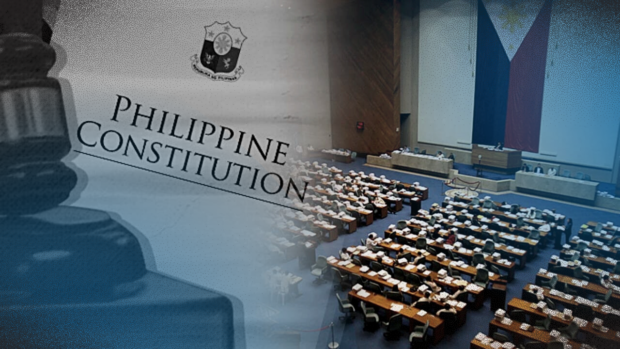
MANILA, Philippines — The House of Representatives scrutinized during its plenary session on Wednesday the Resolution of Both Houses (RBH) No. 6 calling for the formation of a constitutional convention (con-con) to amend the charter.
RBH No. 6 reached the House floor only two days after it was approved at the committee level.
Cagayan de Oro Rep. Rufus Rodriguez, chair of the House panel on constitutional amendments, sponsored the proposed measure and responded to questions raised by some of his colleagues.
Camarines Sur Rep. Gabriel Bordado first pointed out that President Ferdindand Marcos Jr. had said that changing the Constitution was not a priority of his administration because “there are so many other things that we need to do first.”
Rodriguez said he respected that opinion. But he said his panel had consulted representatives of various sectors on the push to amend the Constitution.
According to Rodriguez, a hybrid constitutional convention would have safeguards to ensure that the rights and interests of Filipinos would be protected.
This was drawn from the suggestion of former Supreme Court Chief Justice Reynato Puno, which means the convention would be composed of both elected and appointed members.
“We can place in our bill the bounds of two important limitations to the powers of the constituent assembly. Number one, they should be in congruence with national security. And number two, they are always for the general welfare of the Filipino people,” Rodriguez added.
Cost of a convention
Asked about the budget needed for the constitutional convention, Rodriguez cited the figures given by the Commission on Elections (Comelec):
- P1.5 billion to put a separate line on the ballots for the delegates in addition to the candidates for the barangay and youth polls
- P5 billion for the delegates’ expenses
- P3 billion for the plebiscite itself
So a constitutional convention would cost a total of P9.5 billion, Rodriguez said.
“The amount is minuscule compared to our P5.3 trillion budget and the transcendental importance of having a con-con so that our people will have a new Constitution attuned to globalization and representation and at the same time, provide job opportunities to our people,” Rodriguez said.
Citing the all-time high inflation and skyrocketing prices of basic commodities, Bordado asked if a con-con is a “timely and wise use of our limited and depleted sources.”
“There are always high prices. We are still reeling from the pandemic. But the way to go is to have a constitutional convention. Lift these restrictions. Get more investments. The people will be employed, and they will have purchasing power,” Rodriguez said.
Is charter change the solution?
Gabriela Women’s Party Rep. Arlene Brosas echoed the sentiment of Bordado, questioning the need for constitutional amendments.
Should the proposed economic liberalization in the Constitution actually lead to global competitiveness, she asked what this would do to address rising prices, backward agricultural production, and a lack of national industries.
Rodriguez reiterated his stance: While these were existing problems, opening up the economy and providing more job opportunities to Filipinos will give them purchasing power to buy from local industries.
But Brosas said local industries would only be harmed by green-lighting the entry of more foreign direct investments.
The Makabayan lawmaker then leaped to another concern, asking if the Constitution was the reason why the government could not increase the current wage of workers.
“We believe so… Our problems with the salary and so forth is also partly because our Constitution is very restrictive. In fact, it is common knowledge that foreign investors here under companies pay higher wages and salaries, and we want that to be given to the benefit of our workers,” Rodriguez said.
Brosas pointed out, however, that the regional wage hike policy was not set in the Constitution.
“It is possible, at any point and time, to raise the salaries of workers, but that’s not being done,” she said, speaking partly in Filipino.
Rodriguez agreed, noting that Congress can legislate a national wage. But since this has not been done, he pointed to the “peculiarities and situations” in different regional wage boards.
“What I’m saying is that if we open the country to more investments, they’ll go to different regions, and it will have an effect on the salaries. Because normally, foreign investors give higher wages as proven by our data, and it can be able to have an influence on the regional boards to increase the salaries,” Rodriguez said.
But Brosas said: “No foreign investor will prioritize higher wages before their interest for profit.”
“We believe that our country should prioritize increasing the wages before we allow these changes in our Constitution, which can easily be done by the government,” she went on.
“The country can be more confident in doing this if the issues on the importation of onions, sugar, and other commodities, and even the soaring prices, can be addressed. That’s alarming because we reached 8.7 percent inflation.”
Limited to economic amendments
Then asked for assurance that the proposed charter change would only be limited to economic amendments, Rodriguez said: “Clearly, the committee would really want that it would only be economic provisions because we believe that that is what is needed now.”
“The thrust is to have economic amendments. That is why that is what we envision. However, as we all know, if we have a constitutional convention, it’s open really to some political amendments,” he added.
Earlier, Sen. Robin Padilla, chair of The senate panel on constitutional amendments, said he would rise to object should the direction of the charter change move toward political amendments.
RELATED STORIES
House approves constitutional convention to amend charter
Charter change not needed to get foreign investments – Marcos
Philippine inflation rose to 8.7% in January
Padilla assures Cha-cha will only cover economic provisions, not political